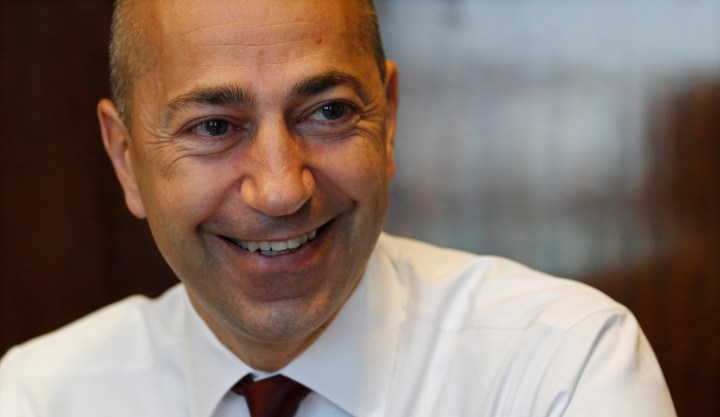Sport
Ivan Gazidis: Arsenal’s Mandela connection

Arsenal’s CEO, Ivan Gazidis, was born in apartheid-era South Africa and his dad spent two years in prison for his association with the ANC. It’s another small reminder of how far South Africa’s influence stretches and just how great this country’s potential is. By ANTOINETTE MULLER.
Over the course of the last 12 days or so, everyone who is anyone who has some sort of connection to South Africa has spoken out and shared their story. It’s just natural, it happens. When a country, and the world, is grief-stricken, everyone scrambles to try and relate and offer sympathies.
Ivan Gazidis, CEO of Arsenal, is one of those people. Any Arsenal fan worth his or her salt will know that Gazidis was born in South Africa. Regardless of how you feel about him as a businessman or as Arsenal’s head honcho, it’s a fact South African Arsenal fans like to reiterate because South Africans like to see their own making an impact on the global game.
The story becomes more interesting, though. Costa Gazidis, Ivan’s father, was a political prisoner and spent six months in solitary confinement in a jail near Johannesburg. He wasn’t even allowed to attend the funeral of his own father and was told that his son had died at birth.
Costa was a medical student at Wits University and was acutely aware of the brutality of apartheid and how cruel the systems were. It is at University where Ivan’s father first took a stand. During autopsies, only white students were allowed to watch the dissection of white bodies while black students were allowed to watch both. One day, a body arrived for dissection and lecturers thought it’d be a black body, it was white instead and all students were asked to leave the room. Costa left, too. It’s there where Costa’s interest in politics began and he became more involved with the ANC. Costa even once met with Mandela to discuss the anti-apartheid movement in South Africa after the former president was smuggled into the country. Also present at the meeting was an informer and that’s where it all unravelled for the doctor.
The police raided the Gazidis home one morning at 5am. Although the search was efficient, they did not find his mother’s typewriter, something which was used to write up materials for the ANC. His dad, though, was put on trial and represented by George Bizos, the same man who represented Nelson Mandela. His sentence was two years in prison, six in solitary confinement. Down, but not out, Costa learnt how to cope in solitary confinement through the secret code developed by the prisoners.
Listen to the pipes at night and there would be tapping, one tap for A, two for B and so forth. It’s something that would keep him sane. He also tried to escape twice. Because of a train running in close proximity to the jail, the noise from the train would give him 30 seconds to get out and make a run for it. He never managed to get away and was released after serving time, although he was placed under strict surveillance and blacklisted as a doctor. Costa was not allowed in as room with more than two people at the same time.
Recalling the time and the brutality of the apartheid government during an interview with The Telegraph, Ivan speaks about how anybody associated with the anti-apartheid movement endangered those associated with them.
“Some of his friends were killed,” says Gazidis. “Parcels would come through the letterbox, one of his friend’s four-year-old child opened the parcel and it blew the family to smithereens. Anybody associated with you was at risk. Life was essentially made intolerable.”
Costa worked as a mine doctor for a while, but the conditions were harsh. He floated between jobs, but the blotch on his name would always come up when trying to find something new. With no future as a doctor, Costa surrendered the family’s passports and moved to the United Kingdom to start over. They arrived with nothing and lived in Edinburgh and Portsmouth before relocating to Manchester.
For Ivan, his parents are a great source of pride and he still holds a strong emotional connection with the country of his birth.
“To recognize the evil of it, it was extremely difficult. I have admiration for people who not only recognized it was wrong, but took action against it. It makes you wonder if anyone would want to put their life and their family’s lives on the line, working passionately for a cause that really wasn’t theirs. I ask myself that question,” Gazidis said. “I find myself in awe of it. It’s something I’m very proud of my parents for. It dramatically affected their lives. They could have led comfortable lives,” he told the NY Daily News in 2010.
“Sometimes it just catches me unawares, I well up and I can’t control it,” he explains. “It happened when I was flying out to Johannesburg for the World Cup. I was watching Invictus on the plane and I just started sobbing. It was a bit embarrassing actually,” says Gaizids.
Costa’s story doesn’t just end where he had packed up and left, though. He returned to South Africa in 1994 and forged a passionate fight against HIV and AIDS. He became a health commissioner and started to prescribe AZT to his patients.
The government at the time were against these drugs and eventually his father accused the minister of health of manslaughter and the much publicised court case of Dr Costa Gazi hit the headlines in 1997. According to Harvard, over 300 000 died due to the denialism from South Africa’s rulers during that time and the knock on social and economic effect those deaths had on families is probably even worse. Costa was eventually acquitted for the charges and still lives in Cape Town.
The story is intriguing because it shows just how far South Africa’s impact stretches and how many people were influenced by the fight against apartheid and the leaders of the struggle. It’s a small glimpse into just how monumental of an impact it had on the world and another reminder of just how tremendous Nelson Mandela’s influence was. It’s everywhere, in every corner of the globe and from these corners of influence, South Africa has the potential to have the world at its feet. DM
Photo: Chief Executive Officer of Arsenal Ivan Gazidis. (REUTERS/Suzanne Plunkett)



















 Become an Insider
Become an Insider